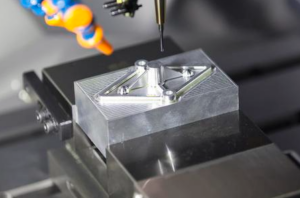In the realm of automotive manufacturing, the integration of composite materials has become increasingly prevalent, introducing unique challenges in precision machining. Circular Diamond Wire Cutting has emerged as a cutting-edge technology, providing an efficient and accurate method for shaping composite materials used in the automotive industry.

Composite Materials Cutting
The automotive industry is continually evolving, with a growing emphasis on lightweight construction and enhanced fuel efficiency. The adoption of composite materials, known for their high strength-to-weight ratio, poses challenges in terms of precision machining. Circular Diamond Wire Cutting stands as a pivotal technology, addressing these challenges and revolutionizing the cutting processes involved in composite materials used in automotive manufacturing.
Circular Diamond Wire Cutting employs a continuous loop of diamond-coated wire, guided in a circular motion, to make precise cuts in materials. When applied to composite materials, this technique leverages the hardness of the diamond-coated wire to efficiently cut through the various components of the composite, including fibers and matrices. The circular motion ensures uniformity in the cutting process, contributing to the accuracy and efficiency of shaping composite materials.
Circular Diamond Wire Cutting finds critical applications in the automotive industry for cutting composite materials, including:
a. Body Panels: The technology is employed in shaping composite body panels, contributing to the lightweight construction of vehicles without compromising structural integrity.
b. Interior Components: Circular Diamond Wire Cutting is utilized in the fabrication of interior components, such as dashboards and trim pieces, where precision and a high-quality finish are essential.
c. Structural Components: The cutting technique is applied in shaping composite structural components, including chassis elements and reinforcement materials, to optimize strength and weight.
a. Precision and Accuracy: The use of diamond-coated wire ensures precise cuts, enabling the creation of intricate and accurately dimensioned composite components for automotive applications.
b. Reduced Material Wastage: Circular Diamond Wire Cutting’s efficiency minimizes material wastage, optimizing the use of expensive composite materials and supporting sustainable manufacturing practices.
c. Versatility: This cutting technique is adaptable to various types of composite materials, including carbon fiber composites, fiberglass, and hybrid materials, providing versatility in automotive applications.
d. Enhanced Surface Finish: The technology contributes to an improved surface finish, reducing the need for additional finishing steps in the fabrication of composite components for automotive use.
While Circular Diamond Wire Cutting has proven to be a transformative technology in composite material cutting for automotive manufacturing, challenges such as tool wear and process optimization persist. Ongoing research is focused on refining diamond coatings, exploring advanced cutting strategies, and enhancing the technology’s applicability to emerging composite materials.
Circular Diamond Wire Cutting stands as a pivotal technology in the evolution of automotive manufacturing, particularly in the realm of cutting composite materials. Its applications in body panels, interior components, and structural elements underscore its significance in advancing the field. As research and development efforts continue, Circular Diamond Wire Cutting is poised to play a crucial role in shaping the future of precision cutting in composite materials for the automotive industry.



